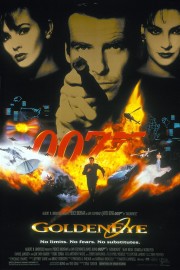Goldeneye
Thinking back on the Pierce Brosnan era of Bond between 1995-2002, it’s increasingly clear that his first outing, “Goldeneye,” was his best. It’s not that his other three films as the iconic character were bad– his next film, “Tomorrow Never Dies” has a lot going for it –but “Goldeneye” still felt like an old-school Bond movie, whereas the later films felt more like American action exercises from that era: over budgeted, cast with the “next hot thing” rather than people right for the part, and less focused on story and more on making the action scenes as massive as possible, coming to a head in Brosnan’s last film as the character, “Die Another Day,” leading to the paired-down reboot in 2006.
In a way, though, “Goldeneye” was a reboot of the franchise as well. The main reason I say that is because, unlike it’s predecessors made through 1989, there was a big real-life shift that the series had to express. In 1990, the Cold War came to the end. Now, the villains couldn’t just be geopolitical foes, but more ambiguous. Politics still played a role, but in a new age, motivations are less certain. That’s especially true of “Goldeneye,” which adds friendship and betrayal to the equation, which is a big part of why “Goldeneye” is so memorable in the Bond canon.
Another big aspect is the music. Of course, the score has always played a big role in Bond’s adventures, from the iconic theme to the opening credits song (which this film got right with Tina Turner’s title tune) to the score itself. This time, the score is by Eric Serra, who is best known for his work with the French action director, Luc Besson, and I always hoped he would return to the franchise, because as good as David Arnold did from 1997-2008 (especially for “Royale”), Serra’s odd, electronic orchestrations fit this new era of 007 perfectly. This is especially true of the action sequences, which benefitted greatly from the same percussive rhythms he brought to films like “The Professional” and “La Femme Nikita.” And when he delivers that great Bond theme into play, even during something as absurdly over-the-top as this film’s tank chase in St. Petersburg? Classic Bond magic.
Also important is a strong villain, and Sean Bean’s Alec Trevelyan, a former MI-6 agent turned terrorist after a mission in Russia where Bond watches Alec die (or so he thinks), and then blows up the place in typical Bond cold opening fashion. The scars are both external and internal for Alec, who has reinvented himself as a Russian gun runner. His plans are bigger, though, when he works with a Russian officer to hijack a Cold War weapons system code named Goldeneye, which causes an electromagnetic pulse that knocks out everything in an entire city. When it’s used on a small, Russian town with a supposedly abandoned Russian satellite installation, Bond and the people at MI-6 (led by M, played by Judi Dench in her first stint in the role she would own by 2012’s “Skyfall”) get wind of things, starting the cat-and-mouse chase for those responsible. Bean’s role isn’t a complex one as written, but in the actor’s more than capable hands, becomes something of a template for the type of intelligent, calculating villain we love to see Bond come up against.
The story and screenplay (by Michael France, Jeffrey Caine, and Bruce Fierstein) aren’t the sharpest in series’s modern run, mainly because they still adhere to formula more than later films like “Royale,” “Skyfall,” and “Tomorrow Never Dies,” all of which shook things up in surprising, exciting ways, but the director, Martin Campbell, brings out an intelligence, and wicked humor, that harkens back to the old days, but also brings it up to date with the times, calling the character out on his misogynist ways, which is part of what made the choice of a female M all the more inspired. Yes, you still have the flirtations with Moneypenny (Samantha Bond); the bad Bond Girl in Famke Janssen’s all-timer, Xenia Onatopp; and the good Bond Girl in Russian computer analyst, Natalya Simonova (Izabella Scorupco), but even those elements seem to be infused with a modern spin while also feeling at home with the legacy of 007. Campbell returned to the franchise 11 years later in “Royale,” and though he branched out to other endeavors as a result of the success of his two Bond films (with varying degrees of success; he scored with “The Mask of Zorro,” but couldn’t handle the comic book world of “Green Lantern”), nothing fit him quite as well as Bond does. With “Goldeneye,” anchored by a fine turn by Brosnan, whose turn had finally arrived after his gig on TV’s “Remington Steele” forced him to decline the role in the ’80s, it’s easy to see why Campbell would be back, and why, after sputtering after two Timothy Dalton outings, Bond returned to the forefront of movie action franchises, this time for good, it appears.










